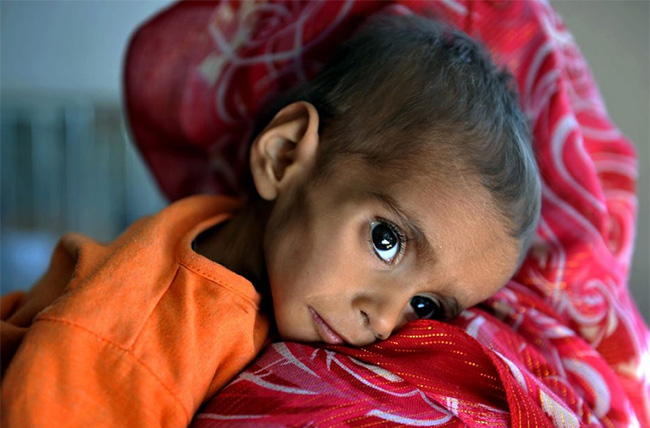A large number of Afghan children are suffering from non-press or hidden crisis called malnourishment, and we are witnessing epidemic of behavior problems and learning disorders in our children both schools, Universities and communities. While treatment of these hidden challenges is very costly for our society - not only in terms of the financial cost, but also in terms of emotional cost as a future generation. No attention is focused on diet and nutrition for the treatment and prevention of these tragic conditions in Afghanistan!
Most of social and political issues caused to forget some fundamental topics, and discussions on the mental and emotional development of children ignore the fact that brain is a very important organ of the body, and just like every other organ of the body, it requires good nutrition. And when we talk about the brain, we also need to talk about the second brain, the small intestine, where digestion and assimilation take place. The brain looks like guts, and they have similar interrelated effects in many ways. For example, there are just as many nerve cells in the gut as there are in the brain, and most of the nerve cells in the gut connect with the brain.
The nutritional requirements of brain and guts need to be considered together when we talk about emotional and mental health of our children and next generation. And we need to have this conversation very soon because we are facing an incredible crisis, the likes of which we have never seen before in the history of mankind. Some children are damaged so profoundly that they cannot even make emotional contact with their parents and their siblings. And also we have thousands of children who are retarded due to iodine deficiencies and malnourishment. But these retarded individuals could express emotions. Today the horrible condition called autism along with other manifestation of brain starvation such as learning disorders, mental problems, and inability to concentrate behavior problems, violence, addiction and mental retardation threaten the fabric of our culture.
Many of the problems are directly linked to poor government guidelines, chronic poverty and unawareness of parents throughout the country. And now what are we going to do? How do we get back to having normal children, and how do we help the children who have these problems?
Role of vitamins
According to experts, quality of food and certain nutrients such as vitamins A, D, B12 and K2 are the most critical factors for the brain to form, to develop and to function properly, for good mental health and for nervous system to function normally, and deficiencies manifest as psychiatric disorders, such as obsessive-compulsive behavior, irrational anger, depression, manic depression, Alzheimer’s and dementia. And where do we get these nutrients? Do we get them from vegetable oils? No, do we get them from imported chemicals? No, do we get them from margarine? Only a little bit of synthetic vitamin A added to the margarine. We get them from the fat of grass-fed animals–the very food that are disappearing from our daily diets.
Iodine and iron deficiencies
Shortages of nutrients such as iron and iodine can impair cognitive and motor development, and these effects are often irreversible. Iodine deficiency can lead to enlargement of the thyroid and irreparable mental retardation in infants and children whose mothers were iodine deficient during pregnancy.
Similarly, there is growing evidence that DHA, an essential fatty acid, is a key component of the intensive production of synapses that makes the first years of life a critical period of learning and development. Many other nutrients—chlorine, folic acid, and zinc, to name just a few—have been linked specifically to early brain functioning.
Infect, the role of nutrition in brain development is complex. The effects of most nutrient shortages depend on the extent and duration of the shortage, and in many cases, the brain’s need for a particular nutrient changes throughout its development. Early shortages can reduce cell production; later shortages can affect cell size and complexity. Nutrient deficits also affect the complex chemical processes of the brain and can lead to less efficient communication between brain cells.
Food insecurity also linked to nutrient deficiencies that lead to learning and development problems, especially among infants and toddlers. Long-term effects include low achievement in schools (particularly amongst Afghan-girls due to food discrimination between boys and girls in the families), emotional problems, and poor health. A recent study, finds that compared to their peers in food-secure families, food-insecure children under age 3 are:
90 percent more likely to have poor health
31 percent more likely to spend time in the hospitals
76 percent more likely to have problems in cognitive, language, and behavioral development
Based on the above, if we want to have intelligent, happy and well-adjusted children, we will need to combat poverty, support our natural live stocks, train food experts in national universities and publically, raise mass awareness. People need to be aware of Function of adequate nutrition for pregnant mothers and infants for normal brain development. They must know that Pregnancy and infancy are important periods for the formation of the brain, laying the foundation for the development of cognitive, motor, and socio-emotional skills throughout childhood and adulthood. Children with restricted development of these skills during early life are at risk for later neuropsychological problems, poor school achievement, early school dropout, low-skilled employment, and poor care of their own children, thus contributing to the intergenerational transmission of poverty.
Home » Opinion » Hidden Challenges Leading to Weak Generation
Hidden Challenges Leading to Weak Generation
| Mohammad Zahir Akbari

